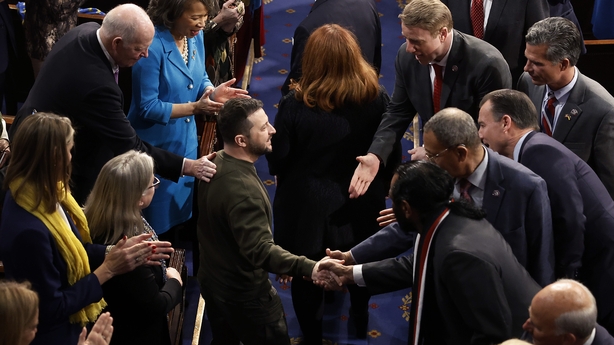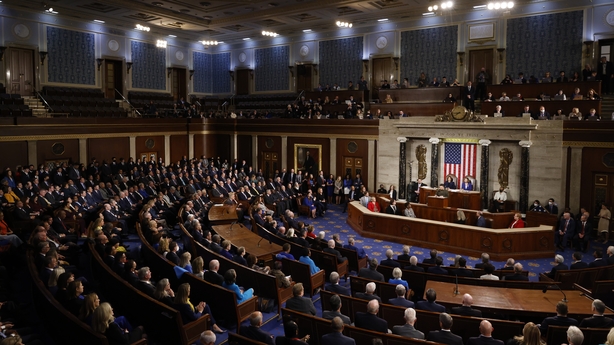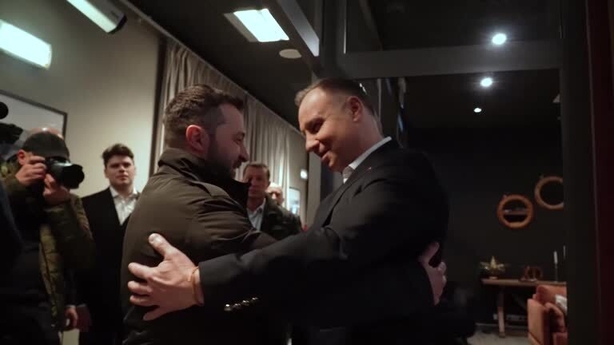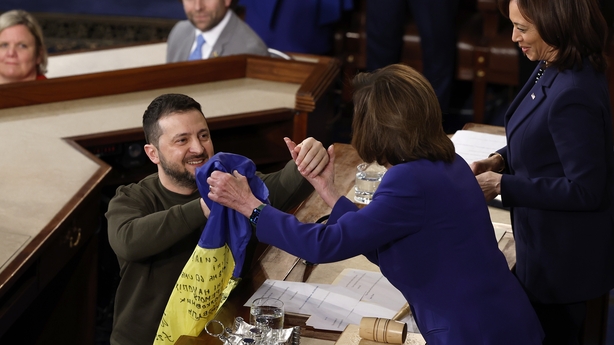Ukrainian President Volodymyr Zelensky has told the US Congress that aid to Ukraine was an investment in democracy and "not charity" as he invoked American battles against the Nazis in World War II to press for more assistance for his country's war effort.
Mr Zelensky's comments yesterday come as Republicans - some of whom have voiced increasing scepticism about sending so much aid to Ukraine - are set to take control of the US House of Representatives from Democrats on 3 January.
Some hardline Republicans have even urged an end to aid and an audit to trace how allocated money has been spent.
"Your money is not charity. It is an investment in the global security and democracy that we handle in the most responsible way," Mr Zelensky told a joint session of the US Senate and House of Representatives, speaking in English.
We need your consent to load this rte-player contentWe use rte-player to manage extra content that can set cookies on your device and collect data about your activity. Please review their details and accept them to load the content.Manage Preferences
The world is too interconnected to allow any country to stand aside and feel safe, Mr Zelensky said as he appealed for bipartisan support.
On his first foreign wartime visit yesterday he met with US President Joe Biden, who called for support to keep flowing in 2023.
The United States also announced another $1.85 billion in military aid for Ukraine, including a Patriot air defence system to help it ward off barrages of Russian missiles.
Mr Zelensky said the Patriot system was an important step in creating an air shield.
"This is the only way that we can deprive the terrorist state of its main instrument of terror - the possibility to hit our cities, our energy," Mr Zelensky told a White House news conference, standing next to Mr Biden.
"We would like to get more Patriots ... we are in war," he said.
Russia says it launched its "special military operation" in Ukraine in February to rid it of nationalists and protect Russian-speaking communities. Ukraine and the West describe Russia's actions as an unprovoked war of aggression.

Ukraine has come under repeated Russian strikes targeting its energy infrastructure in recent weeks, leaving millions without power or running water in the dead of a freezing winter.
TASS news agency cited Russia's US ambassador as saying that Mr Zelensky's visit confirmed that US statements about not wanting a conflict with Russia were empty words.
America's provocative actions in Ukraine were leading to an escalation the consequences of which were impossible to imagine, TASS cited Anatoly Antonov as saying.
Russia said last week that Patriot systems, if delivered to Ukraine, would be a legitimate target for Russian strikes.

House members and senators from both parties cheered parts of Mr Zelensky's speech as he likened his country's battle to World War II and even the American Revolution.
Referencing former US President Franklin D Roosevelt, who served between 1933 and 1945, and efforts to liberate Europe from Nazi occupation, Mr Zelensky appealed to Americans as they gathered with family for Christmas.
"Just like the brave American soldiers, which held their lines and fought back Hitler's forces during the Christmas of 1944, brave Ukrainian soldiers are doing the same to Putin's forces this Christmas," he said.

Travelling back from Washington, President Zelensky met his Polish counterpart Andrzej Duda.
"They talked for a long time, almost two hours", President Duda's top aide, Pawel Szrot, said.
"First of all, about President Zelensky's visit to the United States and the importance of the visit for support for Ukraine, but also about bilateral relations between Poland and Ukraine," Mr Szrot told Reuters.
Congress is on the verge of approving an additional $44.9bn in emergency military and economic assistance, on top of some $50bn already sent to Ukraine this year as Europe's biggest land conflict since World War II drags on.
White House National Security Council spokesman John Kirby said Washington was seeing no sign that Russian President Vladimir Putin was willing to engage in peacemaking.

Kremlin spokesman Dmitry Peskov said more Western arms supplies to Ukraine would lead to a "deepening" of the conflict.
Mr Zelensky said a "just peace" with Russia meant no compromises on Ukraine's sovereignty and territorial integrity.
Russian forces attacked targets in the Zaporizhzhia region and pushed to advance near the battered eastern frontline towns of Bakhmut and Avdiivka, the focal point of fighting in the Donetsk region, Ukraine's military said yesterday evening.
The commander of Ukraine's 'Freedom' battalion, Petro Kuzyk, helping to defend Bakhmut, told the website of Espreso TV: "Each day, there are anywhere from seven to ten attempts to storm our positions. And it's the same at night."
"They won't be able to take Bakhmut, but if they take the heights above it and set up their artillery and cut our logistical arteries, that will make the situation much more difficult," Mr Kuzyk said.
Mr Putin has promised to give his military whatever it needs to prosecute the war nearing the end of its tenth month and backed a plan to boost the size of the armed forces by more than 30%.
The Kremlin has said Washington and Kyiv were turning a deaf ear to Russia's concerns following Mr Zelensky's US visit.
"We can say with regret that so far neither President Biden nor President Zelensky have said even a few words that could be perceived as potential readiness to listen to Russia's concerns," Mr Peskov told reporters.
"Not a single word was heard warning Zelensky against the continued shelling of residential buildings in towns and villages in Donbas and there were no real calls for peace.
"This suggests that the United States is continuing its line of de facto fighting an indirect war with Russia to the last Ukrainian," he added.

